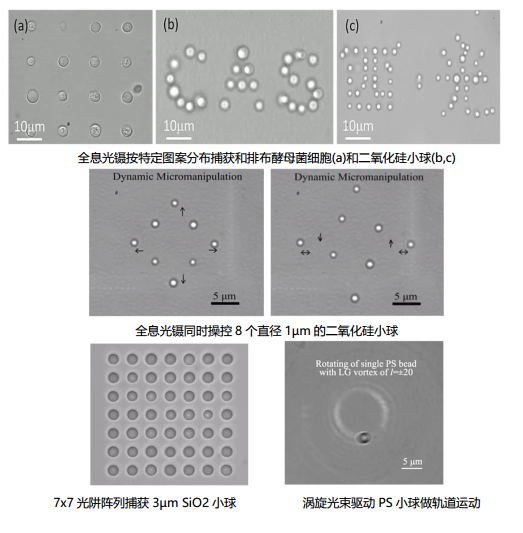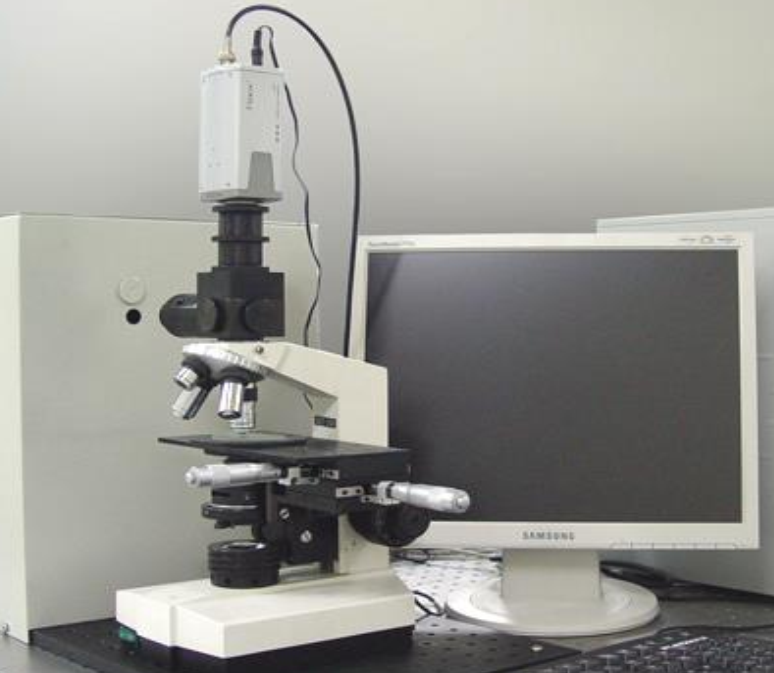- 首页
- Application Solutions
- Holographic optical tweezer system
Holographic optical tweezer system
- Description
- Brand
Description

Surise holographic optical tweezer system
The holographic optical tweezer micromanipulator can generate an array of spot wells arranged and distributed arbitrarily, capture multiple particles at the same time, and independently control each of them through the computer to achieve complex dynamic manipulation. Holographic phototweezers can be used in the study of atomic physics to trap and cool atoms and study Bose–Einstein condensates; In colloidal physics, anomalous physical phenomena such as the attraction of charged particles to each other can be studied; In the field of biology and medicine, it can deeply study the individual behavior of living cells and biological macromolecules, explore the law of life movement, and is suitable for scientific research in physics, chemistry, biology, medicine, agriculture and related fields.
Holographic optical tweezer system
Based on the latest spatial light field control technology, the holographic optical tweezer micromanipulator uses the spatial light modulator to modulate the incident laser wavefront to obtain various pre-designed light field distributions in the focal area of the objective lens, so that multiple particles can be multi-functional capture and manipulation.
This instrument combines laser technology, digital holographic technology and microscopic imaging technology, the laser is shaped and modulated by the spatial light modulator, and then acts on the microscopic object and captures it through the high numerical aperture objective, and the action process is input into the computer through the CMOS image sensor acquisition system through the microscopic imaging system. The instrument consists of laser system, space light field control module, optical microscopic imaging system, precision stage, image acquisition mode, computer control and software system. The sample to be observed is placed on a stage, imaged on the CMOS photosensitive surface through a microscope objective, and input into a computer by a CMOS image sensor.
The operator can observe the sample through the display, adjust the objective lens height and illumination source to make the image clear. The laser enters the microscope through the spatial light modulator and focused optical system, and the required computational hologram is generated by the software and loaded into the spatial light modulator, which can generate the required optical trap distribution in the sample plane for capturing sample particles. By controlling the two-dimensional precision moving stage, the laser can accurately act on the position of the sample to be processed, and realize the control of the captured target particles. The above process can be observed directly on the display, and the dynamic and static changes of the sample can be stored on the hard disk by computer control software.
Multiple optical traps are captured simultaneously
By loading a specific computational hologram to the spatial light modulator, the incident light wavefront can be modulated, and then the single incident light can be divided into multiple outgoing beams, thereby generating a large array of spot traps arranged arbitrarily in the focal area of the objective lens.
Multi-optical trap dynamic micro-control
The holographic optical tweezers can independently control the movement of each optical trap, and then control the movement of particles to achieve complex multi-particle simultaneous dynamic control. Dynamic manipulation of particles can be realized by loading the CGH image sequence calculated in advance into SLM, and then refreshing the CGH according to a certain frame rate.
Special mode beam micromanipulation
With SLM, special mode beams such as Laguerre-Gaussian beams, Bessel beams and Airy beams can be modulated. Due to its special phase distribution and propagation characteristics, special mode beams are widely used in optical tweezer technology, such as the use of LG beam rotating particles to study the transmission of orbital angular momentum, and the use of Bessel beam and Airy beam transport particles to achieve particle sorting.

Laser optical tweezer system
This laser optical tweezer micromanipulator is made of semiconductor excited laser; optical microscopic imaging devices; Two-dimensional precision stage; Lighting source; laser-coupled optical path; Laser microbeam adapter; CCD image sensor; Computer; frame grabbers; Image display and control software; Optical shockproof flat plate and other parts. This instrument can be used as a digital microscope at the same time, providing the convenience and speed brought by digitalization.

High operating accuracy: The stage is controlled by a spiral indexing head with a moving accuracy of up to 1 micron, which is two orders of magnitude higher than that of ordinary microscope stages, making it easy to operate and control the sample.
High optical tweezer capture force and long objective working distance: Typical optical tweezer systems require the use of a 100X oil lens with a high numerical aperture to focus the beam. Our optical tweezer systems use a specially designed focused optical path, enabling optical tweezer capture using low-power microscopic objectives (10X-40X). Low-magnification objectives work at millimeters and can be manipulated deeper into the sample, which is especially important in some experiments; At the same time, it also avoids the inconvenience caused by the use and maintenance of high-magnification oil mirrors.
The optical system is easy to modify and upgrade: the whole machine is fixed on a 475mmx275mmx13mm optical shockproof flat panel to ensure stable and reliable system performance.
Provides real-time motion image capture: Some microscopic processes, such as mid-cell division processes, can be filmed into AVI movies.
Brand
OEfind
相关产品
Ultrafast laser parallel machining system
$20,000.00
Optical teaching demonstration system
$20,000.00



